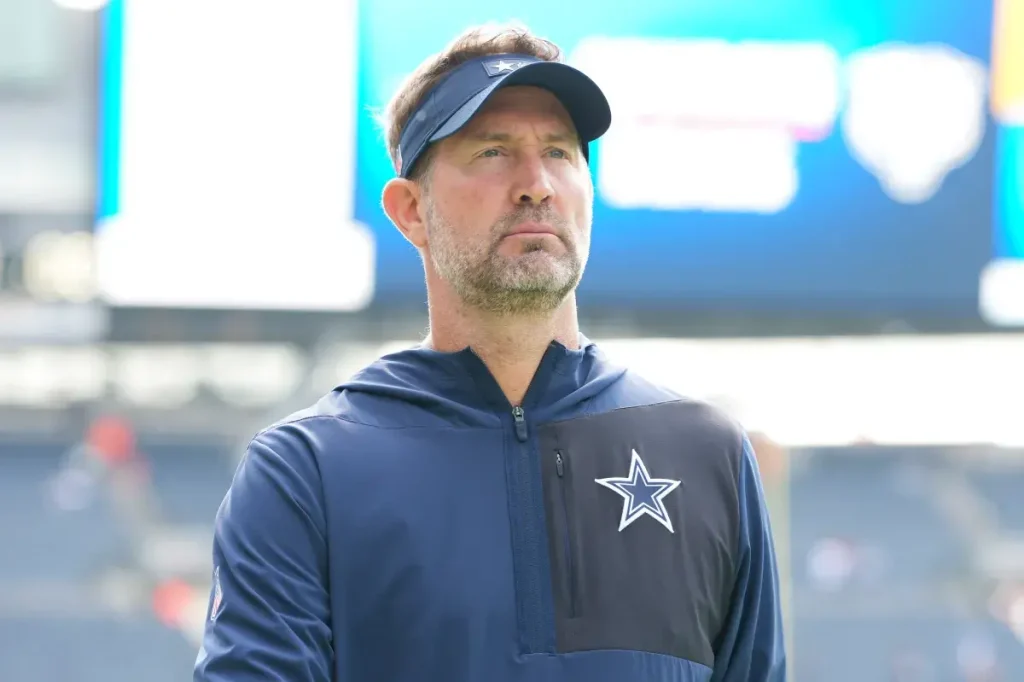Cowboys Coach Schottenheimer Addresses Diggs Benching, Reveals Growth in Relationship
In the aftermath of the Dallas Cowboys’ dramatic 40-40 tie with the Green Bay Packers on “Sunday Night Football” in Week 4, attention has shifted to the relationship between first-year head coach Brian Schottenheimer and star cornerback Trevon Diggs. The decision to bench the former All-Pro corner raised eyebrows across the NFL community, especially given Diggs’ proven impact on the field despite his early-season struggles. The situation became a focal point heading into the team’s Week 5 matchup against the New York Jets, with many wondering about potential friction between the coach and one of his defensive stars. However, Schottenheimer’s recent comments suggest the situation might be evolving into a healthy dynamic rather than a lingering conflict.
Speaking candidly to reporters on Friday, Schottenheimer described his conversation with Diggs as “interesting,” acknowledging that they had exchanged opinions and “agreed to disagree on some things.” What stands out most from the coach’s comments was his praise for how Diggs responded to the benching, both in his play during the Packers game and in practice since then. “I’ve been blown away by his work this week and how well he’s been doing,” Schottenheimer remarked, before adding a personal touch that humanized their relationship: “That’s what I love about him. I get mad at my kids all the time. And they still love me. And I still love Trevon.” This family-oriented analogy suggests Schottenheimer views his relationship with players as something deeper than just professional, allowing for disagreements while maintaining mutual respect and affection.
The situation became more nuanced when reports emerged that Diggs had approached defensive coordinator Matt Eberflus with tactical suggestions, specifically recommending that the Cowboys defense play more man-to-man coverage instead of their prevalent zone schemes. Rather than viewing this as insubordination, Schottenheimer embraced the dialogue, telling reporters, “We don’t think that we have all the answers. The guys that play the game are so important and so impactful that absolutely, I talk about scheme with all of our players a lot.” This perspective reveals a coach who values player input and recognizes the expertise that comes from those on the field, marking a departure from more traditional top-down coaching approaches that have dominated NFL history.
Perhaps most telling was Schottenheimer’s passionate defense of player feedback in his system: “I would be really pissed off if our players felt something and didn’t come sit down with me and say, ‘Hey, Schotty, I think we should be doing this.'” This statement demonstrates a coach committed to open communication and collaborative problem-solving, even while maintaining that such input doesn’t guarantee changes in approach. “Does that mean we’re gonna do it? No, not necessarily. But I’m gonna listen,” he explained, striking a balance between receptiveness and maintaining his authority as head coach. This dynamic suggests a healthy team culture where ideas can flow freely without undermining the coaching staff’s ultimate decision-making responsibility.
Despite the apparent tension created by the benching, Diggs demonstrated his value during the Packers game with a crucial defensive play late in the second half. By reading a Green Bay screen in the red zone and forcing the Packers behind the line of scrimmage, he helped stall their momentum at a critical juncture. This moment likely validated Schottenheimer’s decision to keep Diggs involved despite the earlier benching, showing that even amid personal differences, the team’s performance remained the priority for both coach and player. The cornerback’s ability to stay focused and make impact plays despite the situation speaks to his professionalism and commitment to the team’s success.
As the Cowboys prepare for their matchup against the Jets, the Schottenheimer-Diggs relationship appears to be developing into something potentially beneficial for the team’s culture. While Schottenheimer acknowledged the defense “has not been playing great,” he was quick to clarify that it’s “not just because we’ve been playing zone defense,” addressing Diggs’ tactical concerns while avoiding placing blame on any single approach or player. This nuanced stance demonstrates a coach willing to accept criticism while maintaining perspective on the complex challenges facing his team. The evolving relationship between Schottenheimer and Diggs could serve as a template for how modern NFL coaches can balance authority with player empowerment, potentially creating a more adaptive and resilient team culture in Dallas as the season progresses.


